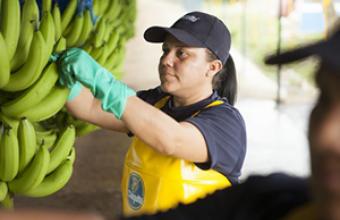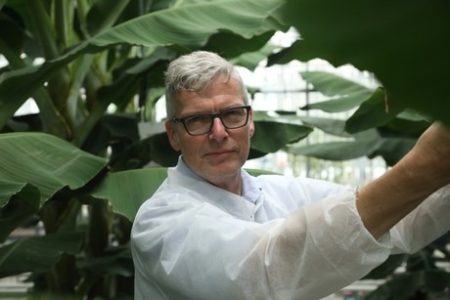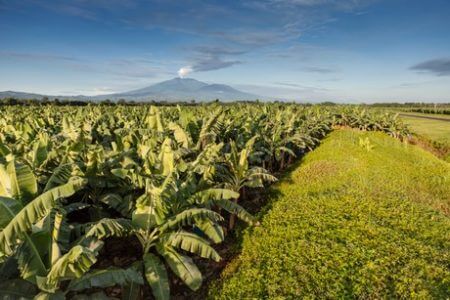Experts meet in Boston to discuss worsening banana fungal disease



29th August 2018 in: News



29th August 2018 in: News
La enfermedad de Panamá, la enfermedad fúngica que vive en la tierra de los trópicos, parece extenderse más rápido de lo que se temía en un principio. Es uno de los descubrimientos que se discutieron en la conferencia reciente del Congreso Internacional de Patología Vegetal (ICPP) que tuvo lugar en Boston entre el 29 de julio y el 3 de Agosto. ICPP tiene lugar cada cinco años y ofrece es una oportunidad para que los profesionales de la industria y los científicos discutan problemas actuales y propongan soluciones potenciales.
Este año parte del programa estaba dedicado a la enfermedad de Panamá, y las noticias no fueron buenas para los cultivadores de bananas. Una cepa de la enfermedad fúngica (Raza Tropical 4 (TR4)) es una de las más devastadoras para las cosechas de banana. La enfermedad hace que las plantas de la banana se marchiten, y ninguna región o cultivador es inmune. De momento no hay un tratamiento comercial para erradicar o al menos controlar la TR4.
Según el profesor Gert Kema de Chiquita Bananas: “La TR4 ha tenido efectos devastadores en plantaciones de banana en varias partes del mundo. La TR4 se identificó a finales de los años 60 en Taiwán, pero nadie le prestó mucha atención, de ahí que continuara extendiéndose. Solo cuando encontramos a la TR4 fuera del sureste de Asia el sector acabó con su silencio y básicamente ´despertó´, ya que en ese momento nosotros y otros habíamos descubierto muchas más incursiones de la TR4. Nos encontramos ahora en un punto de no retorno, y tenemos que prepararnos para lo peor mientras invertimos en soluciones sostenibles”.
Y continuó diciendo que: “Además de causar la enfermedad de Panamá en las bananas Cavendish, la TR4 puede afectar a muchas otras variedades de banana. Es un gran peligro para las bananas porque actualmente no hay métodos de control fiables”.

Profesor Gert Kema
La conferencia ICPP revela que la situación está empeorando
En la conferencia los científicos declararon que la situación de la TR4 está empeorando. De acuerdo con el doctor Kema, uno de los problemas es que muchos en la industria continúan ignorándola y no invierten de un modo adecuado para encontrar una solución. El doctor dijo que Chiquita Bananas está poniendo de su parte para ayudar a organizar la conferencia y es un socio que está listo para colaborar, y dispuesto a hacerlo.
Kema dijo: “En la conferencia ICPP de 2018, las discusiones incluyeron la TR4, la vulnerabilidad de la producción global de la banana, y la nueva visión de Chiquita sobre la sostenibilidad. Chiquita ayudó a reunir a destacados científicos, investigadores, miembros de la industria e instituciones para enfrentarse a esta amenaza inminente. En Boston se reunieron científicos de todo el mundo para discutir el estado actual de la I+D y cómo se puede lidiar con la TR4. A parte de Chiquita, ninguno de los socios de la industria han tomado iniciativas para para la situación e invertir en I+D en pos de la sostenibilidad.”
“El estado actual de la diseminación de la TR4 es mucho peor de lo que se esperaba. El futuro de la diseminación de la TR4 es desalentador, pero tenemos las herramientas para frenar la enfermedad, así como los métodos, materiales, habilidades y una comunidad para invertir la tendencia. Chiquita está lista para poner en marcha el proceso”.
Tratamientos actuales y potenciales
Como ya se ha mencionado, actualmente no hay un producto comercial disponible para los cultivadores de bananas. Se han probado muchos métodos con resultados mixtos. Generalmente los mejores métodos requieren de una aplicación precisa, y sería necesario mejorarlos para que sean prácticos para un uso comercial. Los científicos dicen que la clave es llegar a la enfermedad en la planta y después aplicar el tratamiento a gran escala.

Plantación de bananas en Costa Rica
Según Kema: “Los métodos de saneamiento del suelo, como la inundación, son muy efectivos, pero exigen adaptaciones e inversiones enormes. Además, el agua disemina el hongo muy bien. Los tratamientos químicos son malos para el medio ambiente y los trabajadores. La desinfección biológica del suelo ha tenido resultados excelentes, pero es necesario mejorarla hasta un nivel práctico. Se ha sugerido la modificación genética de la Cavendish, además de cultivar variedades mutantes. Aunque son soluciones potenciales, las bananas mutantes y modificadas genéticamente con la enfermedad de Panamá como objetivo no abordan otros problemas importantes en la producción actual de la banana, como la Sigatoka negra. Estos enfoques son hasta cierto punto estrechos de miras, ya que no tratan los problemas subyacentes de los monocultivos o la uniformidad genética, y por ello son, como mucho, una solución temporal”.
Kema añadió: “Aunque de momento no hay una cura que pueda reemplazar la Cavendish o resistir la enfermedad, espero que estén disponibles dentro de tres a cinco años. Contamos con métodos biológicos que necesitan ser mejorados y no se pueden usar en plantas individuales, pero son una posibilidad en procesos de rejuvenecimiento de plantaciones y en aplicaciones a todo el campo de cultivo.”
Es esencial trabajar juntos
Aunque hay tratamientos potenciales para la TR4, su desarrollo es obviamente caro, difícil y a largo plazo. Por ello, Kema instó a la industria a trabajar juntos y poner en común sus recursos para hacer que sea posible una solución a largo plazo, reiterando que ningún cultivador, ya sea grande o pequeño, puede evitar la enfermedad.
Según Kema: “Toda la industria de la banana tiene que colaborar, expandirse, hacer uso del talento nuevo, rejuvenecerse y olvidarse de sus propios objetivos. Necesitamos escuchar al sector y trabajar con él para beneficiar a todos los cultivadores de bananas. Es muy artificial hacer una separación entre los productores pequeños y los industriales, ya que todos sufren los mismos problemas y necesitan innovación en todos los aspectos. Por ello, el sector y la comunidad tienen que adoptar las tecnologías más avanzadas en la protección y mejora de la banana, y emplear perspectivas a largo plazo, ya que los problemas graves normalmente no se pueden solucionar con soluciones simples”.
Los objetivos de sostenibilidad de Chiquita Bananas, un factor de la responsabilidad
Chiquita Bananas ha desarrollado un programa de sostenibilidad, “Behind the Blue Sticker”, que según la compañía sirve de guía para sus decisiones en lo que respecta al futuro de su negocio de la banana. Kema resumió los “tres pilares” que conforman el programa y cómo se relacionan con la lucha contra la TR4.
“Los dos primeros pilares se centran en nuestro procesos centrales y su entorno, y con ello cubren temas como los sueldos, el medio ambiente, la educación de género, etc.”, explicó Kema. “El tercer pilar se centra en nuestra responsabilidad dentro de la industria. La TR4 es un riesgo grave para la seguridad alimentaria y el sustento de millones de personas. Es una obligación morar para todos los involucrados en la industria de la banana permitir que la innovación lidie con esta enfermedad, algo que Chiquita acepta incondicionalmente. Creemos que es nuestro deber tomar la iniciativa, ser innovadores y trabajar de un modo proactivo por el futuro de la industria de la banana. Es por ello por lo que chiquita apoyó el ICPP 2018 en Boston para iniciar un diálogo sobre soluciones sostenibles a largo plazo”.
Y concluyó: “Está claro que nunca deberíamos subestimar la amenaza de la enfermedad de Panamá. Si figura siempre en el orden del día, nos hacemos responsables y de un modo realista pedimos que se actúe. En vez de rellenar las grietas y crear falsas expectativas, generamos nuevos datos y estrategias para una mejora estructural y general de la banana. Estamos orgullosos y agradecidos de que Chiquita haya decido hacer un cambio, lo que requiere coraje y profesionalidad para construir asociaciones versátiles de socios que tienen una visión y ambición compartida para transformar la producción de la banana (independientemente del mercado de exportación o la producción de pequeños agricultores para los mercados domésticos) en un negocio sostenible y justo.”

Necessary cookies are absolutely essential for the website to function properly. This category only includes cookies that ensures basic functionalities and security features of the website. These cookies do not store any personal information.
Any cookies that may not be particularly necessary for the website to function and is used specifically to collect user personal data via analytics, ads, other embedded contents are termed as non-necessary cookies. It is mandatory to procure user consent prior to running these cookies on your website.